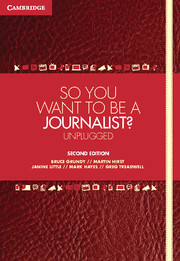Book contents
- Frontmatter
- Contents
- About the authors
- Preface to the second edition
- Acknowledgements
- Acknowledgements for the second edition
- Introduction Journalism unplugged
- Part 1 DISCOVERING JOURNALISM
- Part 2 FINDING AND UNDERSTANDING NEWS
- Part 3 NEWS-WRITING ACROSS THE GENRES
- Part 4 Legal and ethical issues
- 10 Journalism and the law
- 11 Dealing with defamation – everyone has the right to reputation
- 12 Some thoughts about ethics today
- 13 Regulating journalism
- 14 The meaning of professional in journalism
- References
- Index
14 - The meaning of professional in journalism
from Part 4 - Legal and ethical issues
Published online by Cambridge University Press: 05 October 2012
- Frontmatter
- Contents
- About the authors
- Preface to the second edition
- Acknowledgements
- Acknowledgements for the second edition
- Introduction Journalism unplugged
- Part 1 DISCOVERING JOURNALISM
- Part 2 FINDING AND UNDERSTANDING NEWS
- Part 3 NEWS-WRITING ACROSS THE GENRES
- Part 4 Legal and ethical issues
- 10 Journalism and the law
- 11 Dealing with defamation – everyone has the right to reputation
- 12 Some thoughts about ethics today
- 13 Regulating journalism
- 14 The meaning of professional in journalism
- References
- Index
Summary
Chapter objectives
The aims of this chapter are to:
Provide an understanding of some basic issues of professionalism that all reporters and those in the news industry – or even savvy consumers of news – should be talking about
Open up a more intellectual discussion of what journalism is and who journalists are
Show that professionalism also includes behaving within the norms of the law and assessing what is and what is not ethical behaviour for a journalist (as discussed in previous chapters)
What does it mean to be professional?
Journalists of all schools of thought hold the theory that, like a poet, a journalist is born, not made. There is a certain amount of truth in this theory, but the scope of newspaper activity has been so widened by the march of events and the spread of education that real success in the profession can only be attained by a close study and a clear understanding of its technique.
H.A. Gwynne, in Carr & Stevens, Modern Journalism (1931)This statement, in the Foreword to Modern Journalism, is perhaps the first articulation of how the profession of journalism was born (or, if you like, made). But the sub-title used by the authors in this 1931 edition was ‘A Complete Guide to the Newspaper Craft’. Throughout the twentieth century, journalism slowly made the transition from craft to trade to profession, and the education of young reporters – both inside and outside the newsroom – was a major factor in that change. Even in 1931, the English reporter was being exhorted to ‘respect his [sic.] profession’ and to ‘regard himself as a trustee for English language’. H.A. Gwynne wrote that these two principles were ‘the foundations of journalism’.
- Type
- Chapter
- Information
- So You Want To Be A Journalist?Unplugged, pp. 276 - 291Publisher: Cambridge University PressPrint publication year: 2012



